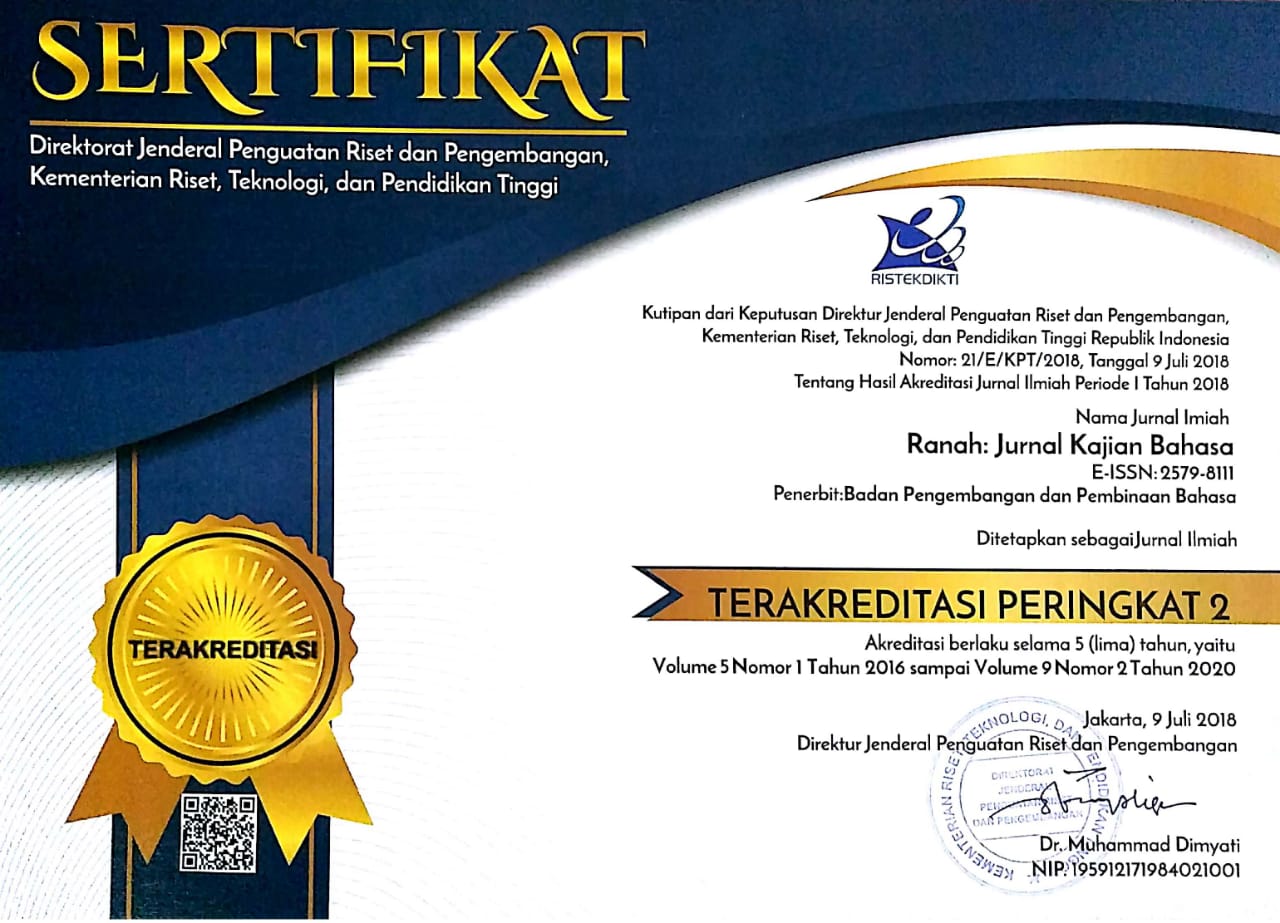Ketriaditisan Konteks Pragmatik Tuturan Tidak Santun: Perspektif Kultur Spesifik
Abstract
The objective of this research was to describe the types of triadicities of pragmatic contexts on impolite utterances in the Indonesian language in culture-specific perspective. The research data were the natural utterances in a culture-specific domain intrinsically containing triadicity of pragmatic contexts. The data were collected and presented through the observation methods, both through the engaged conversation technique and uninvolved conversation technique. The data gathering techniques being applied in the observation method were the recording and note-taking techniques. In addition to the conversation technique, an interview technique was applied both the face-to-face and indirect conversations. The data gathering stage was completed when the data was ready to be analyzed. Data analysis was carried out using the identity method, especially the extralingual identity method. This aligned with the contextual analysis in pragmatics in which contextual aspects must be identified. The results of the study showedthat there were 10 types of triadicities of pragmatic contexts on impolite utterances in the Indonesian language in culture-specific perspective. They were triadicities of pragmatic contexts in: (1) pretense, (2) association, (3) taboos, (4) taunting, (5) arrogance, (6) pleonasm, (7) puns, (8) insults, (9) teasing, (10) interjection. The findings of research bring the significant contribution to the development of pragmatics, particularly the culture-specific pragmatics
Abstrak
Tujuan penelitian ini adalah untuk mendeskripsikan tipe-tipe ketriaditisan konteks pragmatik dalam bahasa Indonesia dengan perspektif kultur spesifik. Data penelitian berupa tuturan-tuturan natural manusia dalam domain kultur spesifik yang secara implisit mengandung triadisitas konteks pragmatik tersebut. Data dikumpulkan dengan menerapkan metode simak, baik simak libat cakap maupun simak bebas libat cakap. Teknik pengumpulan data yang diterapkan adalah teknik catat dan teknik rekam. Selain teknik-teknik tersebut, diterapkan pula teknik wawancara, baik yang sifatnya semuka maupun tidak semuka. Tahap pengumpulan data dipandang selesai ketika data benar-benar telah siap untuk dianalisis. Selanjutnya, analisis data dilakukan dengan menerapkan metode padan, khususnya padan yang bersifat ekstralingual. Metode tersebut selaras dengan metode analisis kontekstual dalam pragmatik. Hasil penelitian menunjukkan bahwa terdapat 10 jenis ketriaditisan konteks pragmatik dalam bahasa Indonesia dalam perspektif kultur spesifik. Kesepuluh jenis tersebut adalah ketriaditisan konteks pragmatik dalam tuturan yang mengandung makna: (1) kepura-puraan, (2) asosiasi, (3) tabu, (4) ejekan, (5) kesombongan, (6) pleonasme, (7) lelucon, (8) hinaan, (9) godaan, (10) interjeksi. Temuan penelitian ini diyakini dapat memberikan kontribusi signifikan bagi pengembangan ilmu pragmatik, khususnya pragmatik dalam perspektif kultur spesifik.
Keywords
Full Text:
PDFReferences
Adu-Amankwah, D., & McDowell, J. (2003). An ethnopragmatic study of jokes and joking in an Akan community. Folklore.
Bibok, E. N. T. & K. (2001). Pragmatics and the Flexibility of Word Meaning (1st ed.). Amsterdam: Elsevier Science Ltd.
Bucholtz, M., & Hall, K. (2007). Language and Identity. In A Companion to Linguistic Anthropology. https://doi.org/10.1002/9780470996522.ch16
Chen, J. (2017). Research Trends in Intercultural Pragmatics. Australian Journal of Linguistics. https://doi.org/10.1080/07268602.2016.1204903
Darling, N., & Steinberg, L. (1993). Parenting Style as Context: An Integrative Model. Psychological Bulletin. https://doi.org/10.1037/0033-2909.113.3.487
Fleming, L. (2015). Taxonomy and Taboo: The (Meta)Pragmatic Sources of Semantic Abstraction in Avoidance Registers. Journal of Linguistic Anthropology. https://doi.org/10.1111/jola.12073
Fraser, B. (1999). What are discourse markers? Journal of Pragmatics. https://doi.org/10.1016/S0378-2166(98)00101-5
Goddard, C. (2009). Not taking yourself too seriously in Australian English: Semantic explications, cultural scripts, corpus evidence. Intercultural Pragmatics. https://doi.org/10.1515/IPRG.2009.002
Goddard, C. (2012). "Early interactions" in Australian English, American English, and English English: Cultural differences and cultural scripts. Journal of Pragmatics. https://doi.org/10.1016/j.pragma.2012.04.010
Habib, R. (2008). Humor and disagreement: Identity construction and cross-cultural enrichment. Journal of Pragmatics. https://doi.org/10.1016/j.pragma.2008.02.005
Hay, J. (2000). Functions of humor in the conversations of men and women. Journal of Pragmatics. https://doi.org/10.1016/S0378-2166(99)00069-7
Hewitt, K. (2014). The regional context. In Advances in Asian Human-Environmental Research. https://doi.org/10.1007/978-94-007-6311-1_1
House, J. (2006). Constructing a context with intonation. Journal of Pragmatics. https://doi.org/10.1016/j.pragma.2005.07.005
Izadi, A. (2016). Over-politeness in Persian professional interactions. Journal of Pragmatics, 102. https://doi.org/10.1016/j.pragma.2016.06.004
Kampf, Z. (2008). The pragmatics of forgiveness: Judgments of apologies in the Israeli political arena. Discourse and Society. https://doi.org/10.1177/0957926508092244
Kashiha, H., & Heng, C. S. (2014). Discourse functions of formulaic sequences in academic speech across two disciplines. GEMA Online Journal of Language Studies, 14(2), 15-27. https://doi.org/10.17576/GEMA-2014-1402-02
Leech, G. (2007). Politeness: Is there an East-West divide? Journal of Politeness Research. https://doi.org/10.1515/PR.2007.009
Limberg, H. (2009). Impoliteness and threat responses. Journal of Pragmatics. https://doi.org/10.1016/j.pragma.2009.02.003
Locher, M. A. (2013). Cyberpragmatics: Internet-Mediated Communication in Context. Journal of Pragmatics. https://doi.org/10.1016/j.pragma.2012.12.002
Mahsun, M. (2005). Metode Penelitian Bahasa. Jakarta: PT Raja Grafindo Persada. https://doi.org/10.1200/JCO.2008.17.1991
Mills, S. (2009). Impoliteness in a cultural context. Journal of Pragmatics. https://doi.org/10.1016/j.pragma.2008.10.014
Norrick, N. R. (2003). Issues in conversational joking. Journal of Pragmatics. https://doi.org/10.1016/S0378-2166(02)00180-7
Nureddeen, F. A. (2008). Cross cultural pragmatics: Apology strategies in Sudanese Arabic. Journal of Pragmatics. https://doi.org/10.1016/j.pragma.2007.11.001
Page, R. (2014). Saying "sorry": Corporate apologies posted on Twitter. Journal of Pragmatics. https://doi.org/10.1016/j.pragma.2013.12.003
Pagin, P. (2014). Critical Pragmatics. Philosophical Review. https://doi.org/10.1215/00318108-2683585
Rahardi, R. (2017). Pragmatic phenomena constellation in specific culture dimension language study. International Journal of Humanity Studies. https://doi.org/10.24071/ijhs.2017.010109
Rahardi, R. K. (2010). Sosiopragmatik (1st ed.). Jakarta: Erlangga.
Rahardi, R. K. (2016). Personal and Communal Assumptions to Determine Pragmatic Meanings of Phatic Functions. Lingua Cultura, 10(10(2)), 95-98. https://doi.org/10.21512/lc.v10i2.897
Rahardi, R. K. (2017a). Linguistic Impoliteness in The Sociopragmatic Perspective. Jurnal Humaniora. https://doi.org/10.22146/jh.v29i3.24954
Rahardi, R. K. (2017b). Pragmatic Phenomena Constellation in Specific Culture Dimension Language Study. International Journal of Humanity Studies, 1(1), 84-92. https://doi.org/10.24071/ijhs.2017.010109
Rahardi, R. K. (2018). Elemen dan Fungsi Konteks Sosial, Sosietal, dan Situasional dalam Menentukan Makna Pragmatik Kefatisan Berbahasa. In Prosiding Seminar Tahunan Linguistik Universitas Pendidikan Indonesia (SETALI 2018) (pp. 654-658). Bandung: Sekolah Pascasarjana Universitas Pendidikan Bandung.
Rahardi, R. K. (2019a). Integrating social, societal, cultural, and situational contexts to develop pragmatics course learning materials: preliminary study integrasi sosial , sosial, budaya, dan konteks situasional untuk mengembangkan materi pembelajaran pragmatik: studi , 5(2), 169-178. https://doi.org/10.22202/jg.2019.v5i2.3572
Rahardi, R. K. (2019b). Pragmatic Perspective on Phatic Functions and Language Dignity. International Journal of Engineering and Advanced Technology, 8(5C, May 2019), 261-268. https://doi.org/10.35940/ijeat.E1039.0585C19
Rahardi, R. K., Setyaningsih, Y., & Dewi, R. P. (2014). Kata fatis penanda ketidaksantunan pragmatik dalam ranah keluarga. Adabiyyāt: jurnal bahasa dan sastra. https://doi.org/10.14421/ajbs.2014.13201
Rashid, R. A., Ismail, I. R., Ismail, R., & Mamat, R. (2017). Ketidaksantunan dalam Perbualan Bahasa Jepun oleh Pemandu Pelancong Malaysia. GEMA Online Journal of Language Studies, 17(3), 86-105. https://doi.org/10.17576/gema-2017-1703-06
Richards, J. C., & Rodgers, T. (2006). Method: Approach, Design, and Procedure. TESOL Quarterly. https://doi.org/10.2307/3586789
Sorlin, S. (2017). The pragmatics of manipulation: Exploiting im/politeness theories. Journal of Pragmatics. https://doi.org/10.1016/j.pragma.2017.10.002
Sudaryanto. (2015). Metode dan Aneka Teknik Analisis Bahasa: Pengantar Penelitian Wahana Kebudayaan secara Linguistis (1st ed.). Yogyakarta: Sanata Dharma University Press.
Sudaryanto. (2016). Metode dan Aneka Teknik Analisis Bahasa (1st ed.). Yogyakarta: Sanata Dharma University Press.
Timothy, J., & Janschewitz, K. (2008). The pragmatics of swearing. Journal of Politeness Research.
Triki, M. (2002). Pragmatics for ESP Purposes. GEMA Online Journal of Language Studies.
Van Eck, R. (2006). Digital Game-Based Learning: It's Not Just the Digital Natives Who Are Restless. EDUCAUSE Review. https://doi.org/10.1145/950566.950596
Yu, K. A. (2011). Culture-specific concepts of politeness: Indirectness and politeness in English, Hebrew, and Korean requests. Intercultural Pragmatics. https://doi.org/10.1515/iprg.2011.018
Zienkowski, J. (2014). Discursive pragmatics. https://doi.org/10.1075/hoph.8.01zie
DOI: https://doi.org/10.26499/rnh.v9i1.2340
Refbacks
- There are currently no refbacks.








